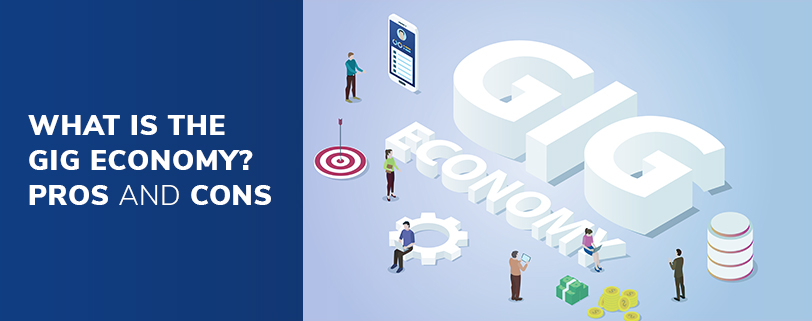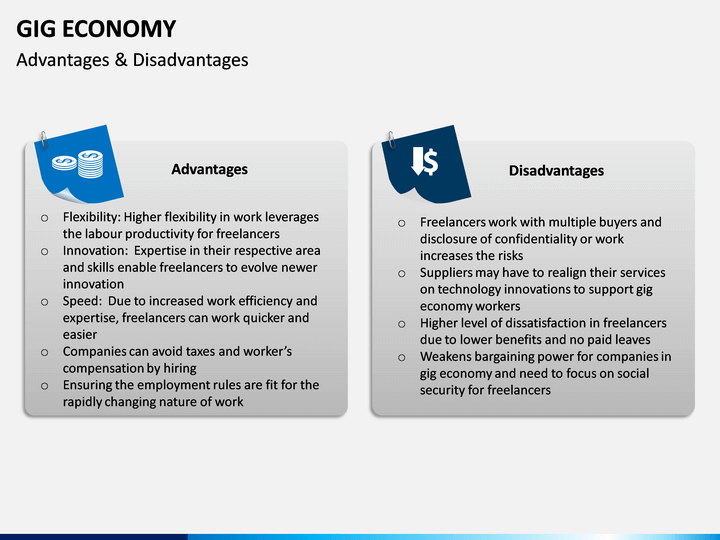Introduction
The gig economy, characterized by short-term freelance or contract work, has transformed the way people earn a living and how businesses operate. This evolving labor market model offers both opportunities and challenges for workers and companies alike. In this article, we will explore the pros and cons of the gig economy, shedding light on its impact on the workforce and businesses.
The gig economy, a dynamic and ever-evolving labor market model, has been reshaping the fundamental structure of work and business operations in recent years. It represents a seismic shift in how people approach employment and entrepreneurship, with profound implications for both individuals and organizations. Let’s delve deeper into the profound transformation brought about by the gig economy:
Changing Work Dynamics: The gig economy has redefined the traditional employer-employee relationship. Instead of long-term, salaried positions, workers now engage in short-term, project-based work arrangements. This shift has blurred the lines between full-time employees and independent contractors, creating a diverse and agile workforce.
Independence and Autonomy: Gig workers enjoy a level of independence and autonomy that traditional employees often do not. They can choose the projects they take on, set their own schedules, and work from anywhere with an internet connection. This flexibility empowers individuals to align their work with their lifestyle and personal goals.
Diverse Income Streams: Many gig workers embrace the gig economy to diversify their income streams. They juggle multiple gigs or freelance contracts simultaneously, reducing the risk associated with relying solely on a single employer. This financial diversification can provide stability in uncertain economic times.
Entrepreneurial Opportunities: The gig economy has given rise to a new breed of entrepreneurs. Gig workers often view themselves as small business owners, marketing their skills and services to a global client base. This entrepreneurial spirit has led to innovative business models and creative problem-solving.
Digital Platforms: The proliferation of digital platforms and online marketplaces has facilitated the growth of the gig economy. These platforms connect workers with potential clients and provide a secure environment for transactions. Freelancers and businesses can find each other with ease, creating a robust gig ecosystem.
Income Stability: Despite its reputation for income instability, some gig workers enjoy financial stability by strategically managing their gigs. They may maintain a roster of long-term clients or use gig work as a supplementary income source, allowing them to mitigate the unpredictability often associated with short-term contracts.
Access to Global Talent: For businesses, the gig economy offers access to a vast pool of global talent. Companies can tap into specialized skills and expertise from around the world, overcoming geographical constraints and broadening their talent acquisition horizon.
Scalability and Flexibility: The gig economy provides businesses with unparalleled scalability. They can rapidly scale up or down to meet fluctuating demand without the overhead of hiring full-time employees. This flexibility enables them to remain agile in a dynamic market.
Challenges for Businesses: Managing a gig workforce can be complex. Effective communication, collaboration, and performance management become essential, especially when dealing with a diverse group of freelancers.
Regulatory Uncertainty: The gig economy has sparked debates about labor rights and classifications. Regulators are grappling with the question of whether gig workers should be considered employees entitled to traditional benefits or independent contractors with greater flexibility but fewer protections.
Evolving Legal Landscape: The legal landscape surrounding gig work is evolving, with jurisdictions worldwide exploring new labor laws and regulations. Companies must stay informed and compliant with these changes to mitigate legal risks.
In conclusion, the gig economy is a multifaceted phenomenon that continues to shape the world of work and business. Its impact on individuals and organizations is a topic of ongoing debate and exploration. As the gig economy matures, finding the right balance between the opportunities it offers and the challenges it presents will be crucial for both workers and businesses seeking to thrive in this evolving landscape.
Pros for Workers
Flexibility: Perhaps the most significant advantage of the gig economy is flexibility. Gig workers can choose when, where, and how much they work. This flexibility is especially appealing to those who value work-life balance and want to control their schedules.
Diverse Income Streams: Gig workers often have the opportunity to diversify their income sources by taking on multiple gigs or projects simultaneously. This can provide a financial safety net in uncertain times.
Skill Development: The gig economy allows workers to hone a wide range of skills by taking on various projects. This continuous learning can enhance their marketability and adaptability.
Entrepreneurial Opportunities: Many gig workers view themselves as entrepreneurs, as they manage their own businesses and clients. This entrepreneurial spirit can lead to innovative business models and personal growth.
To expand your knowledge on this subject, make sure to read on at this location: The Uberization Of Work: Pros And Cons Of The Gig Economy

Cons for Workers
Income Stability: Gig work can be inconsistent, with income fluctuating from one month to the next. This lack of stability can make it challenging to budget and plan for the future.
Lack of Benefits: Most gig workers are classified as independent contractors, which means they are not entitled to traditional employee benefits like health insurance, retirement plans, or paid time off.
Unclear Employment Status: The gig economy blurs the lines between employees and contractors, leading to legal disputes over worker classification and labor rights.
Job Insecurity: Gig workers often lack job security and may not have the same legal protections as traditional employees, making them vulnerable to abrupt contract terminations or nonpayment for services rendered.

Pros for Businesses
Cost Savings: Businesses can reduce labor costs by hiring gig workers, as they do not have to provide benefits or office space. This can lead to substantial savings, particularly for startups and small businesses.
Scalability: The gig economy offers businesses the ability to scale up or down quickly in response to market demand. They can easily onboard freelancers for short-term projects without the overhead of full-time employees.
Access to Specialized Talent: Businesses can tap into a global pool of specialized talent. They are not limited by geographical constraints and can find experts in various fields to meet specific project requirements.
Innovation and Agility: The gig economy fosters an agile work environment where businesses can adapt to changing market conditions rapidly. This flexibility encourages innovation and responsiveness.
Explore this link for a more extensive examination of the topic: What is Gig Economy, Pros and Cons of Companies & Workers?

Cons for Businesses
Management Challenges: Coordinating a remote and diverse gig workforce can be challenging. Effective management, communication, and collaboration may require new tools and strategies.
Quality Control: Maintaining consistent quality when working with a rotating cast of gig workers can be difficult. Businesses may need to invest time in vetting and training freelancers.
Legal and Regulatory Risks: Misclassifying gig workers can result in legal and regulatory risks for businesses. Ensuring compliance with labor laws and regulations is crucial to avoid legal consequences.
Reduced Loyalty: Gig workers are not bound by traditional employer-employee relationships and may lack the loyalty and commitment associated with long-term employees.

Conclusion
The gig economy has reshaped the way work is performed and businesses operate. While it offers flexibility and opportunities for workers and cost savings and scalability for businesses, it also presents challenges such as income instability, lack of benefits, management complexities, and legal risks. Striking a balance between the advantages and disadvantages of the gig economy is key to harnessing its potential for both workers and businesses in the evolving world of work.
The gig economy has reshaped the way work is performed and businesses operate, ushering in a paradigm shift in the labor market. This transformation is characterized by the rise of short-term, contract-based employment arrangements that offer a wide array of opportunities and challenges for both workers and businesses.
On the one hand, the gig economy empowers workers with unprecedented flexibility. Individuals can choose when, where, and how they work, giving them greater control over their schedules and work-life balance. This level of autonomy can be especially appealing to those seeking to balance multiple jobs, caregiving responsibilities, or personal pursuits.
For businesses, the gig economy presents significant advantages. It allows companies to tap into a diverse talent pool, accessing specialized skills on a project-by-project basis without the need for long-term commitments. This flexibility not only reduces labor costs but also enhances scalability, enabling businesses to adapt quickly to changing market demands and scale up or down as needed.
However, the gig economy is not without its challenges. Income instability is a prominent concern for gig workers, as their earnings can fluctuate widely depending on demand and the number of gigs they secure. The lack of traditional employee benefits, such as healthcare, retirement plans, and paid time off, can leave gig workers financially vulnerable, especially during emergencies or periods of low demand.
Businesses in the gig economy face their own set of challenges, particularly in managing a decentralized workforce. Coordinating and supervising gig workers across various locations and projects can be logistically complex. Additionally, ensuring compliance with labor laws and regulations can be a legal minefield, as the classification of gig workers as independent contractors or employees remains a contentious issue in many jurisdictions.
The gig economy also raises questions about worker protections and social safety nets. Many gig workers lack access to traditional labor protections, like minimum wage guarantees and unemployment benefits. Balancing the need for worker protection with the desire for flexibility is a complex policy challenge that governments and businesses must grapple with.
Striking a balance between the advantages and disadvantages of the gig economy is key to harnessing its potential for both workers and businesses in the evolving world of work. This requires innovative approaches to address income stability and benefit access for gig workers, as well as effective management strategies and legal frameworks to ensure fairness, transparency, and compliance. As the gig economy continues to evolve, finding sustainable solutions that benefit all stakeholders will be essential to shape the future of work in a way that is equitable and responsive to the needs of our changing society.
For additional details, consider exploring the related content available here Impact of digital surge during Covid-19 pandemic: A viewpoint on …
More links
To delve further into this matter, we encourage you to check out the additional resources provided here: Pros and Cons of the Gig Economy
